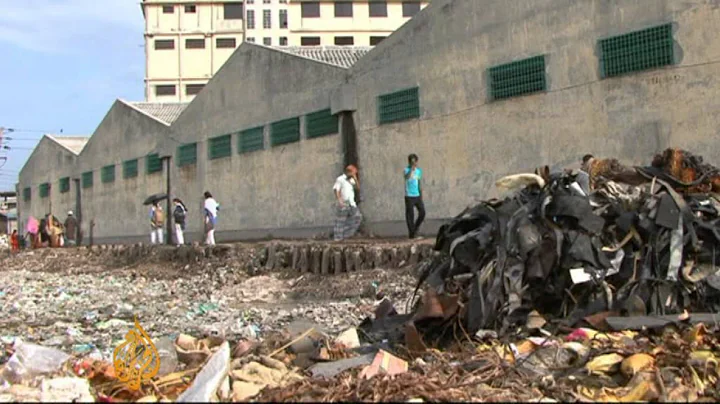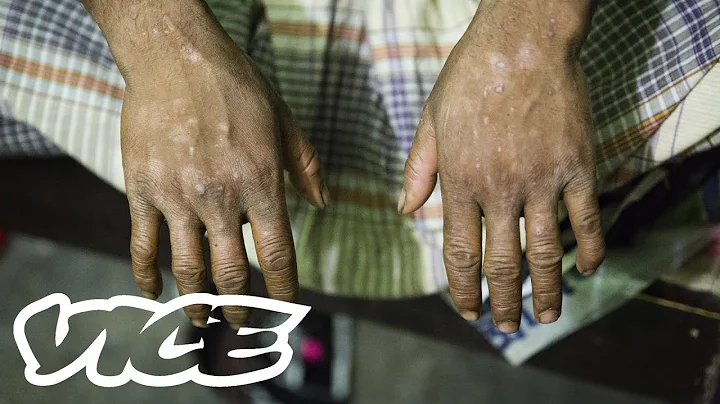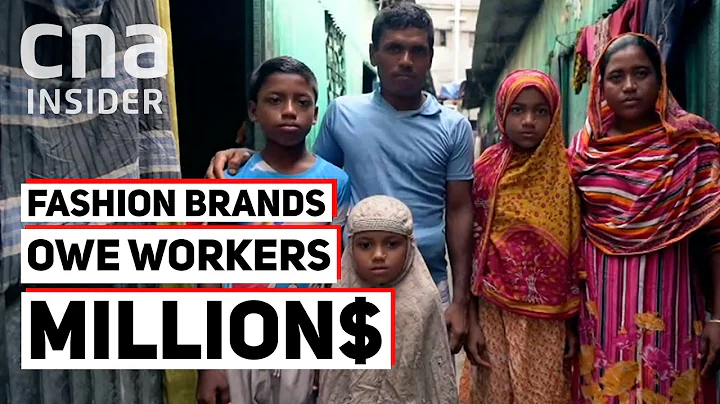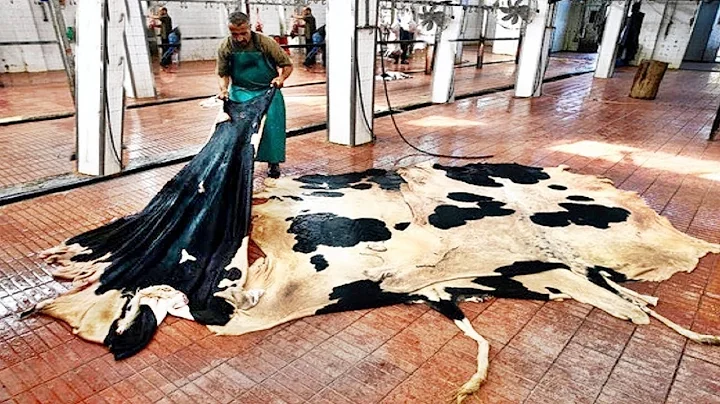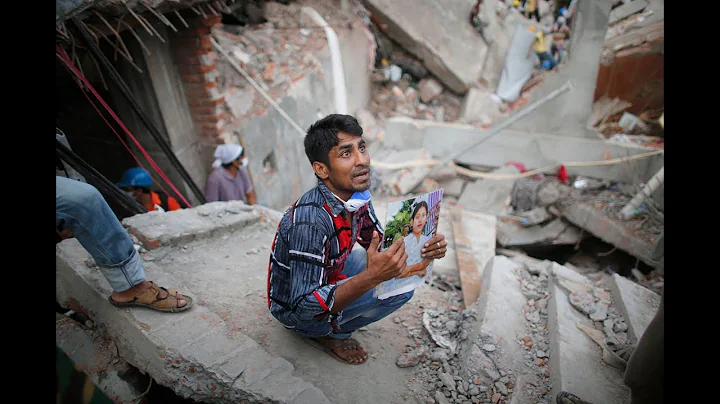How terrible is the leather job in Bangladesh !
2,500 skins are processed every day, 25,000 people get cancer every year, and most workers do not live to be 50 years old.
In order to change the current situation in Bangladesh, our country has extended a helping hand.
- Dangerous and deadly work

In Dhaka, the capital of Bangladesh, the air is filled with the stench of flesh and blood all year round, and sewage flows across the streets, but people are used to it and rush past with their noses covered.
The reason for this harsh environment is that there are more than 270 tanneries on this 25-hectare land.
Due to limited conditions, the production environment for leather production is very harsh.
Every day, 2,000 cubic liters of toxic waste are discharged into the city's main rivers and water supplies, including carcinogenic hexavalent chromium. Wherever it goes, there is a smell, sewage flows across the river, and diseases spread.

Lambala and his father both work in a leather factory, and they process an average of 2,500 skins every day.
After getting the rawhide, Lambala and the others need to sprinkle industrial salt evenly on it to prevent the rawhide from rotting.
are then stacked one by one and moved into the warehouse for storage. During this process, their hands and bodies will be stained with a large amount of salt, aggravating small wounds.
After a day or two of marinating, workers will begin to soften the hides and remove the hair, which is the most physically demanding step in the production process.
There are many fur softening pools in the leather factory. These are not ordinary sewage pools, but chemical pools with more than 50 kinds of chemicals.
There is no ventilation facilities and no safety protection. Lambala and the others are working topless and wearing slippers by the softening pool.
First throw the rawhide into the pool, stir it continuously with a big wooden stick, then pick up the rawhide, drain the water, and then put it into the pool for stirring. This cycle can slowly soften the rawhide.

A piece of rawhide weighs 50-100 kilograms. Workers are sweating just by moving them. This process must be repeated several times a day.
The hair removal process is even more dangerous. In order to improve efficiency, they must directly enter the pool to operate.
Just like killing loaches in the vegetable market, the worker stands in the pool, presses one end of the rawhide, directly scrapes off the surface hair with a knife, then turns the rawhide over and scrapes again, and repeats the same process.
This requires not only good physical strength, but also skills. Only skilled workers can complete the daily tasks.

At this point, the hair removal is not over yet. After scraping off the rawhide, the rawhide must be soaked in other chemical pools for 6-7 days.
The soaked rawhide will appear blue when taken out. This is because the chemical pool is full of chromium. There is a large amount of chromium attached to the rawhide after it comes out of the water, which can be easily oxidized into dangerous hexavalent chromium.
This wastewater can easily cause skin ulcers and cancer among workers.
Immediately after soaking in the liquid, the rawhide will be dehydrated.

Accompanied by the deafening roar of the dehydration barrel, hazardous chemical wastewater without any treatment was discharged directly.
Not only that, the machine hinges and belts are running at high speed around the workers, and the workers do not have any labor protection protective equipment except shorts and vests.
Sometimes the huge dehydration bucket cannot pour out all the dehydrated rawhide. At this time, a short worker needs to climb into the dehydration bucket to remove the stuck rawhide.
The last step of leather making is drying and coloring, but this is not easy either.

Under the scorching sun, workers must first spread out a large amount of skins one by one, and then drive nails all over the edges to ensure that each skin is evenly dried.
Skin tanning is also done manually by workers, who keep hammering nails and constantly shuttle through the drying field full of nails. The cycle goes back and forth...
Finally, the dried skin must be spray-painted according to the requirements of the finished product factory. .
is also spread out one by one and sprayed, without any protective measures. All chemical raw materials can be easily contacted and inhaled by the human body .
It can be said that every process of leather production has caused great harm to the health of workers.
- Workers will not live to be 50 years old

However, workers generally do not understand the dangers of chemical pollution. It is normal to be shirtless and wearing slippers to come into contact with any chemical.
After working every day, simply rinsing your body with groundwater is the best protection.
They even think that they have food and housing in the factory and can earn 360 Singapore dollars (approximately 1,735 yuan) per month, which is much better than going hungry at home.
Lambala lived with his father in a single room in the factory, but it only had walls. The roof was glued together by two people with iron sheets and tape, and there were piles of rawhide filled with stench outside the house.
A small wooden bed and an old ceiling fan were almost all the belongings, but two grown men were forced to share the same bed, making it impossible for them to turn over while sleeping.
Nearly 3 million cattle and sheep hides are transported to factories for processing every year.
Due to prolonged exposure to toxic chemicals, workers often suffer from skin ulcers, gastritis , rheumatic fever , and even cancer .

According to statistics from environmentalists, Bangladeshi leather workers are 52 times and 36 times more likely to suffer from skin diseases and gastritis than ordinary people.
For example, for every 1,000 people, if 12 ordinary people suffer from skin diseases, 581 leather workers will suffer from the disease.
As many as 25,000 people get cancer every year, and workers here generally do not live past the age of 50.
But if you don’t have a heavy burden on you, who will bet your life on tomorrow? In Bangladesh, where the employment environment is grim, this is the only way of life they can choose.
- The harsh environment results from the government’s inaction

Environmentalists believe that the problem of poor environment stems from Bangladesh’s lack of a comprehensive law enforcement mechanism and the government turning a blind eye to factory pollution.
In nearby residential areas, ditches, rivers, and even the air are full of chemical pollution and stench.
What is sad is that because of pollution, housing prices and rents in the neighborhood are very cheap, and many poor people have to stay here.

An old man has been fishing here for 25 years. He said that there are almost no fish left in the river, but occasionally fish can be sold for money. Although the fish meat has a strange smell, some people buy it for consumption.
What’s even more ironic is that in order to protect the river, the old fisherman has donated money to the garbage disposal company all year round, hoping that they will deal with the sewage waste. However, after receiving the money, the company turned around and threw the waste into the river.
The single industrial model also prevents women along the river from finding suitable jobs.
In order to survive, they can only pick up discarded packaging bags and sell them to leather factories for recycling.
Most of these packaging bags are used by leather factories to pack industrial waste, and some are residential waste. All were discarded haphazardly on the river bank.

Before selling to the factory for recycling, they have to do an important job, cleaning the packaging bags.
With no other water source, women have no choice but to work in polluted and smelly ponds or streams.
Being immersed in such "poisonous water" for many years makes their skin often itchy and unbearable, they also have inexplicable fevers, and their bodies are extremely weak.
In this regard, the Bangladesh government has also made suggestions, hoping that people engaged in related jobs should rinse their bodies with clean water for 20 minutes after get off work.
But the problem is, it’s hard to find clean water, so how can you rinse it for 20 minutes?
- China lends a helping hand, the situation improves

Fortunately, Chinese companies have extended a helping hand to Bangladesh, not only providing production protection tools.
also participated in the construction of Bangladesh's largest modern large-scale sewage treatment plant, which is now in operation.
believes that in the near future, tragedies like this in Bangladesh will become a thing of the past.


